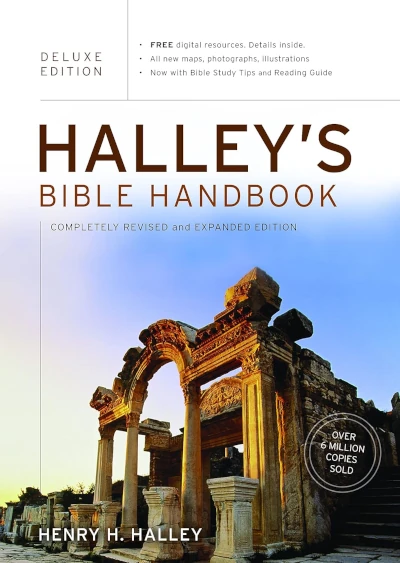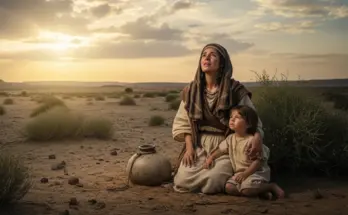When we think of Abraham’s family, our minds often go straight to Isaac, the child of promise. But Ishmael came first. Born to Abraham through Hagar, Sarah’s Egyptian servant, Ishmael entered the world in the tension between faith and impatience. Sarah, barren and waiting, gave Hagar to Abraham, hoping to build a family through her. Yet this decision brought more heartache than peace.
In Genesis 16, 17, and 21, we find Ishmael’s story unfolding with complexity. He wasn’t the son through whom God’s covenant would continue, yet he wasn’t cast aside by God either. Instead, we see something unexpected, divine compassion. Even though Ishmael’s life began through human planning, God still made a promise concerning him.
Discover simple, powerful Bible study habits—order How to Study the Bible for Yourself today!
As we journey through Ishmael’s life, we’ll explore three powerful themes: promise, wilderness, and God’s plan. First, we’ll see that God did not forget Ishmael or his mother. Though man rejected him, heaven responded with mercy. Then, as we follow him into the wilderness, we’ll uncover what it means to survive when everything seems lost. Finally, we’ll reflect on how God’s purpose can unfold even in lives that seem outside the main story.
Strengths and Accomplishments
Ishmael was born into a family full of tension and uncertainty. From the beginning, his life was shaped by strife. Although Abraham loved him, the relationship between Sarah and Hagar made Ishmael’s home life unstable. Yet even in that hostile environment, he endured. He lived with rejection, jealousy, and eventual separation, but he did not disappear. Rather, he grew strong through adversity. His endurance reminds us that God can strengthen us even in troubled surroundings.
Survival and Growth in the Wilderness
When Hagar and Ishmael were sent away, they faced the desert with nothing but a skin of water and each other. However, God met them in that desperate moment. Genesis 21:20–21 tells us plainly, “God was with the boy.” That simple statement says so much. Even in the wilderness, Ishmael survived. He didn’t just live—he thrived. He made his home in the wilderness of Paran and became a man of the wild. In the harshest places, God’s presence makes all the difference.
Father of a Great Nation
Although Ishmael was not the son of the covenant, God still made him a promise. In Genesis 17:20, the Lord said, “I will make him fruitful and multiply him greatly. He shall father twelve princes, and I will make him into a great nation.” That promise came true. His descendants grew into large tribes and peoples. This fulfillment reminds us that God’s word never fails, even for those on the margins.
Legacy as a Skilled Archer
Genesis 21:20 also notes that Ishmael became an expert with the bow. He learned to provide and defend. As an archer, he became a symbol of strength, precision, and independence. Even though he was cast out, he built a life marked by skill and resilience. He didn’t wallow in rejection, he rose above it.
God’s Provision Despite Rejection
Throughout Ishmael’s life, we see God’s faithful care. Others may have pushed him aside, but God never turned away. Even when people fail us, God’s provision stands strong. Ishmael’s story assures us that divine protection doesn’t depend on human approval. He stands as proof that God’s promises can reach us—even in the wilderness.
Weaknesses and Mistakes
In Genesis 21:9, we read that Sarah saw Ishmael laughing or mocking Isaac. Because of this, she demanded his removal. While we aren’t told exactly what Ishmael did, the consequences were serious. Some translations suggest he mocked; others say he laughed. Either way, it caused great offense. Though he may have been a teenager, his behavior brought tension to Abraham’s household. As a result, he and Hagar were sent away. This moment reminds us how even small actions can lead to lasting consequences.
Born of Human Plans
Ishmael’s story begins not with God’s command, but with human impatience. In Genesis 16:1–4, Sarah and Abraham tried to solve their problem themselves. God had promised them a child, but they grew weary of waiting. So, Sarah gave Hagar to Abraham in hopes of building a family through her. Ishmael was born into a situation that began with human effort, not divine instruction. That doesn’t mean he was unloved, but it does show how we often rush ahead of God’s timing.
Outside the Covenant
Even though Ishmael was Abraham’s son, God made it clear that the covenant would pass through Isaac. This wasn’t Ishmael’s fault, but it placed him in a complicated role. He was blessed, yes, but not chosen in the same way Isaac was. This created tension. It also illustrates how God’s plans don’t always follow human expectations. Still, God didn’t abandon Ishmael. He made him into a great nation.
Human Plans vs. God’s Promises
When we reflect on Ishmael’s life, we see a mix of struggle and blessing. He reminds us how easily our choices can create conflict with God’s best. Yet through it all, God remained faithful. Ishmael’s journey teaches us that even when we begin in the wrong direction, God can still bring mercy and purpose.
Lessons from The Life of Ishmael
One of the most powerful truths in Ishmael’s story is tied to his name. In Genesis 16:11, the angel of the Lord told Hagar, “You shall call his name Ishmael, because the Lord has listened to your affliction.” Later, in Genesis 21:17, God heard Ishmael’s cry in the wilderness again. These moments teach us something beautiful—God hears us when we’re hurting. He doesn’t ignore our cries, even when others have turned away. When we feel unseen, we can trust that God still notices.
Even the Cast Aside Are Not Forgotten
After Ishmael mocked Isaac, he and Hagar were sent away. That decision came from human fear and conflict, not divine rejection. Yet God didn’t let them wander alone. He met them in the wilderness, provided for them, and stayed with them. This reminds us that even when people push us aside, God stays near. We may be forgotten by others, but never by our Father.
God Keeps His Promises in Hard Places
God had already spoken a blessing over Ishmael in Genesis 17:20. Despite being sent into exile, God’s promise remained true. Ishmael grew, survived, and became the father of twelve princes. His descendants formed a great nation, just as God said. Even when things looked bleak, God’s word never failed. That same faithfulness is available to us today, no matter our circumstances.
Mercy Beyond the Covenant
Ishmael wasn’t the child of the covenant, Isaac was. Yet that didn’t mean Ishmael was outside of God’s care. He may not have carried the covenant forward, but he still received mercy. This challenges how we see God’s grace. His love extends further than we often expect. Even those who seem outside the main story are still part of God’s plan.
Painful Plans, Redemptive Outcomes
Let’s be honest, Abraham and Sarah’s plan with Hagar wasn’t God’s idea. It came from impatience and doubt. Yet even from that broken situation, God brought about blessing. Ishmael’s life didn’t follow the ideal path, but God still used it for good. That should encourage us. When we face the consequences of bad decisions, ours or others’—we can still trust God to redeem the outcome.
Hope in Our Wilderness
Ishmael’s life points us to a faithful God who stays near, even in the wilderness. When we feel lost, forgotten, or far from the center of the story, we can remember Ishmael. His story assures us that God hears, sees, and provides. We may not understand every twist in the road, but we can be certain of this, God never walks away from His people.

Halley’s Bible Handbook, Deluxe Edition: Revised & Expanded
This full color, revised and updated 25th edition is both comprehensive and inviting, including a concise Bible commentary, important discoveries in archaeology, related historical data, church history, historical geography, and more. It is the culmination of Dr. Halley’s mission: that every Christian be enabled and encouraged to consistently and devotedly read and understand their Bible.
Get Yours on AmazonVital Statistics for Ishmael
Ishmael’s name means “God hears” in Hebrew (Yishma’el), and his life reflects that truth from beginning to end. He was the firstborn son of Abraham, born to Hagar, Sarah’s Egyptian servant. That made him Isaac’s half-brother, though their lives took very different paths.
Even though Ishmael was not the child of the covenant, he still played a vital role in God’s larger plan. He became the patriarch of a great nation, just as God had promised. In fact, Genesis 25:13–16 lists twelve sons—twelve princes—who came from him.
We find Ishmael’s story mainly in Genesis chapters 16, 17, 21, and 25. He’s also mentioned in Galatians 4, where Paul draws spiritual lessons from his life. Ishmael was born in Canaan but later lived in the wilderness of Paran. That setting shaped his strength, independence, and resilience.
Although often overshadowed by Isaac, Ishmael’s legacy continues. His life shows us that God keeps His promises—even when the path is unexpected. Through Ishmael, we’re reminded that no one is beyond the reach of God’s care and blessing.
- Name meaning: “God hears” (Hebrew: Yishma’el)
- Family: Son of Abraham and Hagar; half-brother to Isaac
- Role: Patriarch of a non-covenant nation; ancestor of many tribes
- References: Genesis 16, 17, 21, 25; mentioned in Galatians 4
- Legacy: Father of twelve princes (Genesis 25:13–16), fulfilling God’s promise
- Location: Born in Canaan, later lived in the wilderness of Paran
Closing Thoughts on Ishmael
Ishmael holds a unique place in redemptive history. He wasn’t the chosen seed through whom the covenant would pass, yet God still saw him. That alone reminds us how wide God’s mercy truly reaches. Though Ishmael didn’t carry the covenant promise, he remained under God’s care and blessing.
His life shows us that being outside the main story line doesn’t mean being outside God’s heart. From his birth to his exile, Ishmael’s journey was marked by human mistakes and painful choices. Abraham and Sarah acted out of impatience, and their plan brought conflict. Still, God stepped into the mess with compassion.
Even in the wilderness, God was present. He heard Ishmael’s cry. He provided water. He remained with the boy as he grew strong. These details may seem small, but they reveal a faithful, personal God. So often, we feel forgotten or misplaced. But Ishmael reminds us that we are not invisible to God. He hears us. He sees us. And He walks with us, even when the path is harsh and lonely.
As we reflect on Ishmael’s life, we’re invited to trust God more deeply. His story assures us that divine faithfulness never depends on perfect circumstances—only on a perfect God.
Key Verse for Ishmael
“And God heard the voice of the boy, and the angel of God called to Hagar from heaven and said to her, ‘What troubles you, Hagar? Fear not, for God has heard the voice of the boy where he is.’” (Genesis 21:17, ESV)
Genesis 21:17 beautifully captures the heart of Ishmael’s story: “God heard the voice of the boy…” Though cast out and alone, Ishmael was not forgotten. God heard him where he was, right in the middle of the wilderness.
This verse reminds us that God doesn’t need perfect settings to respond. He hears us in our low places, our barren places, and our broken moments. Just as God heard Ishmael, He hears us too. He sees our tears. He knows our fears. And He answers with comfort and provision.
Even when others turn away, God stays near. He speaks peace to us just like He did to Hagar. So when we feel unseen or unheard, let’s remember Ishmael’s cry. God’s grace reaches us, right where we are.
Explore More Bible Character Studies
This study is part of our Bible Character studies, explore the lives, lessons, and faith of men and women throughout Scripture. For more outlines, studies, and resources, return to the Bible Study Toolbox homepage. Contact us with any questions.




